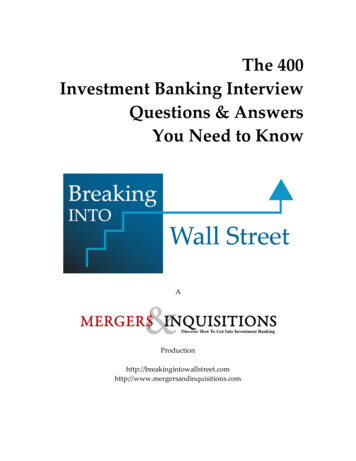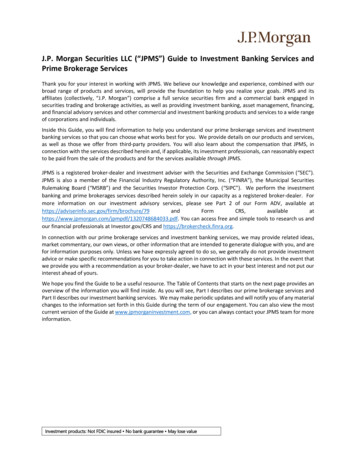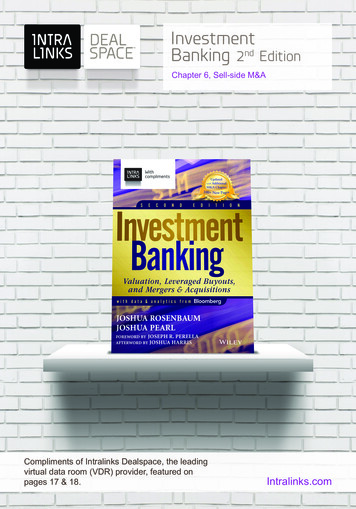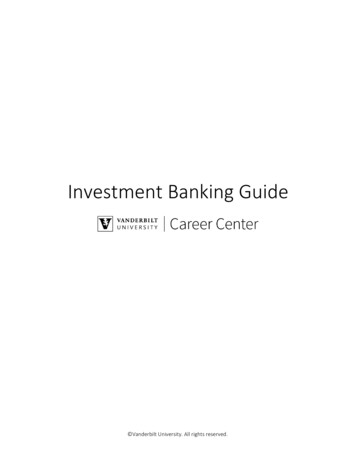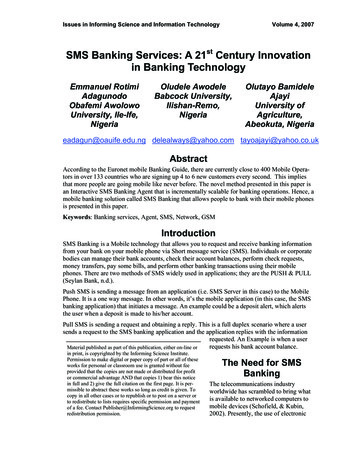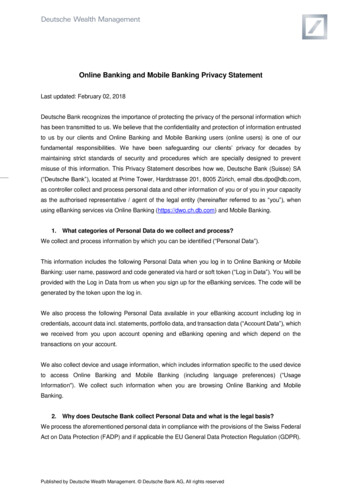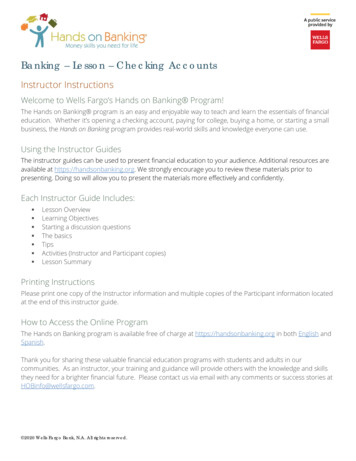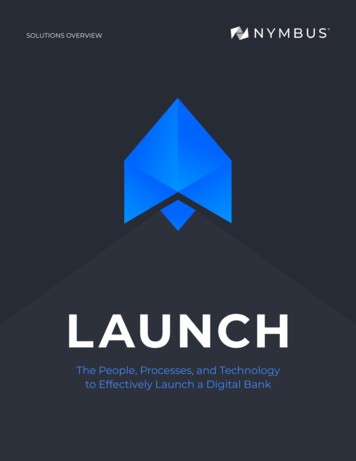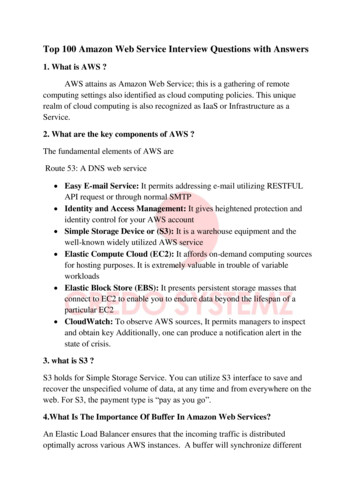
Transcription
The 400Investment Banking InterviewQuestions & AnswersYou Need to tp://www.mergersandinquisitions.com
Copyright 2009 Capital Capable Media LLC. All Rights Reserved.Notice of RightsNo part of this book may be reproduced or transmitted in any form or by anymeans, electronic, mechanical, photocopying, recording, or otherwise, withoutthe prior written permission of the www.mergersandinquisitions.com2
Table of ContentsIntroduction .4Fit / Qualitative Questions .6Analytical / Attention to Detail Questions & Suggested Answers .7Background / Personal Questions & Suggested Answers .10“Career Changer” Questions & Suggested Answers.14Commitment Questions & Suggested Answers .17Culture Questions & Suggested Answers .20“Future” Questions & Suggested Answers .23Strengths / Weaknesses Questions & Suggested Answers .25Team / Leadership Questions & Suggested Answers.29Understanding Banking & Suggested Answers .33“Warren Buffett” Questions & Suggested Answers .39“Why Banking?” Questions & Suggested Answers.45“Failure” Questions & Suggested Answers .48“Outside the Box” Questions & Suggested Answers .52Discussing Transaction Experience .55Restructuring / Distressed M&A Questions & Answers .62Technical Questions & Answers .75Accounting Questions & Answers – Basic .76Accounting Questions & Answers – Advanced .89Enterprise / Equity Value Questions & Answers – Basic .95Enterprise / Equity Value Questions & Answers – Advanced .100Valuation Questions & Answers – Basic .102Valuation Questions & Answers – Advanced .113Discounted Cash Flow Questions & Answers – Basic .119Discounted Cash Flow Questions & Answers – Advanced.128Merger Model Questions & Answers – Basic .131Merger Model Questions & Answers – Advanced .139LBO Model Questions & Answers – Basic .148LBO Model Questions & Answers – Advanced .155Brain Teaser Questions & Answers rgersandinquisitions.com3
IntroductionThis guide has one purpose: to help you answer the most important “fit” and technicalquestions in investment banking interviews. We tell you what’s important and what youneed to say – nothing more and nothing less.Most other guides suffer from several problems:1. The information is not investment banking-specific. Do you think you’re goingto get a question about “Why you’re interested in this position?” I’ll tell youwhy you’re interested – because you want to make a lot of money!2. The information is out-of-date, wrong or incomplete (see: The Vault Guide).These days, interviewers assume you know the basics – like how to value acompany – and go beyond that with advanced questions that require thinkingmore than memorization.3. No answers are provided, or there’s minimal direction (see: The Recruiting Guideto Investment Banking). Of course, you shouldn’t memorize answers word-forword, but it’s helpful to have an idea of how you might structure your answers.4. The questions do not apply to interviewees from diverse backgrounds. If youworked at Goldman Sachs this past summer it’s not hard to convince themyou’re serious about finance – but what if you didn’t? What if you’re making acareer transition or you’re coming in as a more experienced hire? That’s whatthis guide is for.5. The guides were not written by bankers. If you doubt my credentials, just referto Mergers & Inquisitions, where I’ve written over 200 detailed articles onnetworking, resumes, interviews, and recruiting for investment banking andprivate equity. The proof is in the pudding.Your time is limited – so we get you the answers you need, when you need them (rightnow).What follows is a list of 400 investment banking interview questions and answers,divided into different types of “fit” questions (personal, team / leadership, “whybanking,” etc.), technical questions (accounting, valuation, DCF, merger models andLBO models, and brain teasers), and other topics (restructuring, distressed M&A, anddiscussing p://www.mergersandinquisitions.com4
What’s New in the 2nd Edition?A lot. Dozens of more advanced technical questions in each section.40 Restructuring / Distressed M&A questions – very important in today’s market.How to discuss transactions and deal experience in interviews, with sample“good” responses for each question.More fit questions and answers that address important scenarios (explaining badgrades, gaps in your resume, etc.).Plus, video tutorials on how to tell your “story,” sample deal discussions, and sampleinvestment banking interview with full critiques – which you can access via the BIWSmembership site you have access to if you’ve signed up for this guide.These new editions make the guide twice the length of the original version, but youdon’t have to read everything. Pick and choose which sections are most relevant to you.I recommend reviewing the table of contents first and then skipping to the questions youare most in need of understanding. Or you can read the entire guide all at once as well –it’s up to you.In either case, though, the key is to apply what you’re learning and test yourself. Ratherthan reading everything passively, try to answer each question – and then checkwhether or not you got it right. Do that, and you’ll be several steps closer to landinginvestment banking offers.-BrianMergers & InquisitionsBreaking Into Wall mergersandinquisitions.com5
Fit / Qualitative QuestionsAlthough we’d like to think otherwise, there are no “correct” answers you can use forthe qualitative questions you’ll get. They depend on your background and your ownexperience, and everyone’s different.However, there are good ways to answer and poor ways to answer. In this section, wedetail the best techniques along with what you should say – and avoid saying.Most candidates make 2 big mistakes when answering “fit” questions:1. They fail to use specific anecdotes to support their points.2. They do not structure their answers properly.Whenever you’re asked a generic question about “how you work in teams” orsomething of that nature, you need to have anecdotes ready to back up what you say.You should go through this list and your resume and make sure you have storiesprepared for the most common questions – you can then use those and then adapt themas necessary for any new questions you get.Regardless of the question, you also need to structure it properly. Don’t jump aroundfrom point to point – start with the main idea you want to get across and then support itwith examples. Don’t start going off on tangents about your former life in the circus orhow you climbed Mt. Everest.With the exception of the “Walk me through your resume” question, most “fit”questions should take no more than 1 minute for you to answer.Be succinct and conversational in your tone, and you should do fine.Also make sure you review everything on the BIWS site, including the video tutorials onhow to tell your “story” and the sample interviews and critiques right ww.mergersandinquisitions.com6
Analytical / Attention to Detail Questions & Suggested AnswersAnalytical and quantitative questions are more common if you’re a Liberal Arts major orif you haven’t had finance, engineering or math experience.Interviewers are trying to assess whether “you can count” – you don’t need to be a mathwhiz to be a banker, but you do need to be comfortable with numbers and calculations inExcel.So if you haven’t majored in something quantitative or your work experience is alljournalism-related, you’ll want to prepare a few examples of your analytical abilities.Even if you have had finance or analytical experience, you’re still likely to be asked aboutyour analytical skills – they want to test your communication abilities and make sureyou can express abstract concepts clearly.These questions are also a good chance to bring up any independent study of financeyou’ve done, which will help your case once again.1. I see you’ve done mostly journalism and research internships before. Can youdiscuss your quantitative skills?You should respond by discussing specific times when you had to analyze numbersand/or use logic. Good examples might include: your personal portfolio, anymath/science classes you’ve taken, any type of budgeting process you’ve been through,any type of research you’ve done that involved numbers.2. In your last internship, you analyzed portfolios and recommended investments toclients. Can you walk me through your thought process for analyzing the returns of aclient portfolio?The key is to break everything down into steps and be very specific about what you did.So you might say that “Step 1” was getting a list of when they bought each investmentand how much they invested / how many shares they acquired; “Step 2” was finding alist of when they sold each investment, and what they sold them for; and “Step 3” wasaggregating this data over the years in-between for each investment to calculate thecompound .mergersandinquisitions.com7
3. Can you tell me about the process you used to analyze space requirements for thebuilding designs you worked on this past summer?Similar to the reasoning above, break it into steps and start by discussing how you madethe initial estimates, then how you refined them and made them more exact over timewhile staying within budget and collaborating with your team.4. You’ve been working as a lawyer for the past 3 years – what initiative have youtaken on your own to learn more about finance?You should either present a list of self-study courses or certifications such as the CFAthat you’ve obtained, or speak about your own work studying independently fromtextbooks, self-study courses and other sources. Be conservative with how much youclaim to know – re-iterate that you’re “not an expert” but that you have taken theinitiative to learn something on your own.5. You were an English major – how do you know you can handle the quantitativerigor required in investment banking?Combine the answers to questions #1 and #4 for this one – the key is to use specificexamples rather than just saying, “I got a high math SAT score!” Personal financialexperience, classes, self-study courses and independent study work well.6. Can you tell me about a time when you submitted a report or project withmisspellings or grammatical mistakes?It’s unrealistic to claim that you’re perfect and have never done this. Instead, brieflymention a time when you made a careless mistake and then spend the majority of time inyour answer discussing what you learned and how you improved, citing another specificexample of how you improved the second time around.7. What’s the most number of classes you ever took at once and how well did you doin each of them?Once again, it’s best to point to something specific – “During my junior year, I wastaking 5 classes at once as well as working part-time and running my business fraternity– and I still got A’s in all of w.mergersandinquisitions.com8
Not everyone has a perfect answer, but try to think about the most stressful time in youracademic life and use that as a reference for your answer.State the “challenge” first, then how you responded, and then how well you did.8. How well can you multi-task?In keeping with our theme of specificity, give a concrete example of a time when youwere working on multiple projects at the same time – work, school, or activities workequally well for this one. Also emphasize that despite the considerable demands, youpulled off everything successfully. Anything involving teamwork or collaboration isalso good to use in this response.9. Have you ever worked on a project or report that was shown to a large number ofpeople?A journal, student publication or anything similar could be good to mention here, ascould anything shown to a client or multiple clients in your work experience or in aninternship.If you don’t have something like this, the best approach is to come as close possible bysaying, for example, “I haven’t worked on a widely circulated publication, but I didwork on such-and-such , which required that all the details were perfect and that therewere no mistakes ”You could even cite lab or medical work – even if it wasn’t widely circulated, anythingrequiring strong attention to detail ww.mergersandinquisitions.com9
Background / Personal Questions & Suggested AnswersTypical background questions include inquiries about where you went to school(undergraduate and/or business school), what you majored in, and why/where youstudied abroad if you’ve done that.These questions are not too difficult to answer as long as you’re thoughtful and have adecent rationale for what you say.The key points: come across as an interesting person (which you should have no troubledoing) and also talk about how your experience better prepared you for investmentbanking.Even if you did something seemingly unrelated, such as a Math Major, that can beturned into a good response to lead into the inevitable “Why banking?” question you’llget.1. Walk me through your resume.You should really go through all the lessons on telling your “story” right here ory/01-tell-your-story/Start at “the beginning” – if you’re in college, that might be where you grew up or whereyou went to high school. For anyone in business school or beyond, it might be whereyou went to undergraduate, your first job, or even where you went to business school.Then, go through how you first became interested in finance/business, how your interestdeveloped over the years via the specific internships / jobs / other experiences you hadand conclude with a strong statement about why you’re interviewing today.Aim for 2-3 minutes – if you go on longer than this, the interviewer may get bored orimpatient. Also, do not look at your resume when going through your “story.”The 4 most important points:1. Be chronological.2. Show how each experience along the way led you in the direction of w.mergersandinquisitions.com10
3. State why you’re here interviewing today.4. Aim for 2-3 minutes.What are the most common mistakes with the “Walk me through your resume” question?1. Going out of order chronologically.2. Too much exposition – don’t start off by saying, “I’ve had a lot of greatexperiences.”3. Being too short (under 1 minute) or too long (over 5 minutes).4. Not sounding certain you want to do banking/finance.5. Listing your experiences rather than giving a logical transition between each one.Again, I highly recommend going through all the video tutorials on this very question –because your “story” is the most important part of any ategory/01-tell-your-story/2. Why did you attend [Your University / Business School]? I’m sure you had manyoptions. / Why did you transfer to [University Name]?Say that you looked at a lot of places, but settled on wherever you went due to itsexcellent academic reputation, its strong business/finance/economics program, orsomething of that nature. If you were interested in something specific it offered (e.g.you were an athlete and went to Stanford on scholarship, or you went to UChicagobecause of its excellent liberal arts program) you can mention that as well. Try to soundlike you made a thoughtful decision rather than deciding randomly.If you transferred elsewhere, a similar strategy applies but make sure to emphasize itwas for academic reasons. For example, don’t say you wanted to get out ofMassachusetts and move to southern California for an “improved lifestyle!”3. I noticed you studied abroad in [Location]. Can you tell me about that experienceand why you went there?Emphasize you did a lot academically rather than partying 24/7. Many study abroadprograms do, in fact, involve partying 24/7, but you don’t want to admit this. You canmention something about the fun you had, trips you went on, and anything interestingyou did (climbing Mt. Fuji, starring in a Korean soap opera, excavating ruins in ergersandinquisitions.com11
etc.) but don’t over-do it and make them think you did nothing constructive while youwere there. Think “Work hard and play hard” for this one.4. Why did you major in [Your Major]?If it was something related to business/economics, you can discuss your interest in thosefields; for other majors, you can emphasize how you liked the challenge and/or had apersonal interest in the field, but also took the time to learn the basics ofbusiness/finance on your own.5. Where else did you apply for school? Did you get in anywhere else?You applied to a number of top schools and got in at other places, but you went througha careful decision-making process and settled on your school for a very good reason.Show that you’re “in-demand” by others and you always become more attractive –whether it’s to the bank you’re interviewing at or to the schools you’re applying to.6. I see you wrote here that you’re fluent in [Language]. Can you tell me about yourmost recent internship in [Language]?Be prepared for this if you list any common languages on your resume (Spanish, French,Italian, German, Chinese, Japanese, etc.) or if you happen to “get lucky” and yourinterviewer is a native speaker in one of the languages you’ve listed.I would suggest some practice discussing your work experience in whatever language(s)you’ve listed and making sure you can speak intelligently, at least briefly, about whatyou’ve done.If you really don’t know much, just tell them upfront rather than making a fool ofyourself and trying to talk about EBITDA when you don’t know the word for it – I speakfrom experience on this one.7. What do you do for fun?Obviously, don’t say anything illegal or questionable/controversial. If you haveanything interesting or not very common (hang gliding, directing movies, bungeejumping) you should bring that up. Otherwise, just be honest and if you really rgersandinquisitions.com12
watching football (North American football for international readers) or other sports, justtalk about your interest in those.8. What was your favorite class in college / business school?I would not say anything economics/finance-related – it sounds too artificial. Tell themabout something you were actually interested in – even if it’s not directly related tobanking. They want to see who you are as a person, not whether or not you know allthe Excel shortcuts in the book.9. What are your favorite movies / books?There are 2 common mistakes:1. Saying something like Wall Street, American Psycho, or Liar’s Poker that indicatesyou’re a boring person.2. Saying something like Harry Potter that indicates you’re borderline illiterate.Pick something in the middle – above pop literature/film but not something that has todo with finance specifically. That just sounds weird.10. Tell me something interesting about you that’s not listed on your resume.Again, don’t say anything illegal/inappropriate – use common sense. Talking about thattrip to Easter Island or your Brazilian Jiu-Jitsu championship both work ergersandinquisitions.com13
“Career Changer” Questions & Suggested AnswersYou probably weren’t thinking about being an investment banker since age 5.But if you’ve been in an unrelated industry for awhile, you need to be well-prepared for“Career Change” questions.A variant of “Why banking?” questions, “Career Changer Questions” ask why you’retrying to switch industries, why you picked an unrelated major and have now changedyour mind, or even why you’re making a move within finance.It’s best to point to a specific anecdote or someone who sparked your initial interest infinance – assuming you have a story or person in mind.But even if you don’t, there are “generic” responses that can work well.1. You’ve had tons of engineering experience and you’ve worked at many techcompanies. Why do you want to be an investment banker now?Talk about how you dislike the limited advancement opportunities and how your workdidn’t affect the world at large – only what that specific company was doing. You wantto do finance because you like the business aspect of technology more than the technologyaspect of technology and because you want to make an impact with your work andbecome an investor or advisor one day.2. You’ve done Big 4 accounting for the past year – why would you want a job that’s alot more stressful with twice the hours?Because your accounting work was boring and mundane, and because there werelimited advancement opportunities. Finance is faster-paced and you’ve realized thatafter speaking with a lot of friends and doing your own research that it’s just moresuited to your //www.mergersandinquisitions.com14
3. I see you’ve practiced law at Wilson Sonsini for the past 4 years – if you’ve beenthere that long, you’re probably on Partner-track by now. Why would you want toleave a lucrative career in law and go back to being an entry-level Associate inbanking?Emphasize how business people never respect lawyers and view them as nuisancesrather than as a critical part of the team – as a banker, you’d be making deals happenand actually advising companies rather than just proofreading documents and doing“Find-and-Replace” in Word.Of course, you do a lot of this in banking anyway but this angle still works becausebankers really do look down on lawyers.4. I see you worked at McKinsey one summer and then went to Citi investmentbanking the next year. Are you sure you want to do investment banking?Yes. Although you worked at McKinsey, you realized you didn’t like consultingbecause of the wishy-washy nature of the work (making reports and billing by the hourrather than billing by the result) and the constant travel and lack of quantitativeskills/learning.You enjoyed your Citi internship much more and realized you wanted to be in bankingrather than consulting.5. Wow. I must be honest, I rarely see people who have accomplished as much as youhave at your age. You sold your own company for over 1 million within 2 years ofstarting it, and became a leading real estate investor in Asia at the same time. Whywould you ever want to work for other people in banking if you’ve been so successfulon your own?You don’t view things in those terms. Although you did well, there’s always room tolearn and banking would be a great learning opportunity for you. You’ve spoken withmany friends in the industry and have been impressed by what you’ve heard, and youwant to broaden your experience and knowledge so that you can move into higherstakes ww.mergersandinquisitions.com15
6. You’ve worked at a few prop trading firms and also in Sales & Trading. They getpaid pretty well and work market hours – so they have it a lot better than us. Whywould you want to switch to investment banking?You didn’t like the culture of trading, and wanted to have more of an impact byadvising companies on major strategic decisions rather than just making small tradesand investments each day. Banking excites you more because of the broader range ofopportunities and experiences it gives rgersandinquisitions.com16
Commitment Questions & Suggested Answers“Commitment Questions” are tricky to answer, because the tendency is to come acrosseither as too unrealistic or too uncertain.If you’re interviewing for an Analyst position, you don’t want to say you’re 100% certainyou’ll be a banker for life – but you should say it’s what you’re most interested in doing,and that you do have plans to stay in finance or business.MBAs will need to show more commitment and assure the interviewer they are seriousabout making a career out of it.Common questions on this topic include where else you’re interviewing, why you’veswitched careers in the past and testing the old “Why banking?” question again inslightly different forms, just to make absolutely certain you’re committed.1. Where else are you interviewing? Is it just banking? Consulting? Othercompanies?Just banking. You’re not interested in consulting / other options and don’t want towaste recruiters’ time.You need to say this even if you’re so uncertain that you’re deciding between opening azebra ranch, going on a spiritual journey to Nepal, going back to McKinsey or starting alaundromat with your roommate’s uncle.2. Are you mostly interviewing at larger banks like us? What kinds of options withinbanking are you considering?Mostly larger banks, but you have received some interest from other places so you’relooking at a couple options. If you can mention specific names, that makes your answereven better.If you’re interviewing in a group like M&A or Healthcare, talk about how you’re mostlyspeaking with similar groups to show you’re serious about that one ergersandinquisitions.com17
3. Before you entered business school, I see you switched jobs about once a year.How do I know that you’re here to stay for the long-term?Although you switched jobs pre-MBA, it’s quite common to move when betteropportunity arises. However, you’ve done a lot of research, spoken with friends, alumniand other connections and are certain banking is for you after doing your own duediligence. You’ve actually looked into other career options and nothing is as attractiveto you as banking.4. Recently some Analysts and Associates have left “early” and jumped to hedgefunds or private equity. If the opportunity comes up, why would you stay hereinstead?You looked into investing but realized you don’t like the nature of the work – there’s toomuch due diligence and “looking at deals” rather than taking action and actually doingdeals. As a result, after all your research speaking with alumni and other connections,you’re set on banking.5. Tell me about a time when you failed to honor a commitment.The key with this type of question is to bring up a “failure” briefly and then to spendmost of your time talking about what you’ve learned from it and how you’ve improvedrather than dwelling on the failure itself.6. If I gave you an offer right now on the spot would you take it?“Yes, show me the dotted line and I’d sign it right now.”Even if this is a lie, you still have to say it in an interview or you won’t get an offer.7. Let’s say that we were to give you an offer – how long would you need to decidewhether or not to accept it?“Show it to me and I’ll sign and accept it right now.”Some people think this is “unethical” if you’re really not certain, but keep in mind thatuntil you’ve signed something in writing you can do whatever you ergersandinquisitions.com18
No, they won’t like you if you verbally accept and then renege, but it’s not the end of theworld – just the end of your relationship with that ergersandinquisitions.com19
Culture Questions & Suggested AnswersA Managing Director once told me that he had never heard a good answer for the “Whyour firm?” question in an interview – but that doesn’t mean you can’t try.To do so, focus on the people – whom you’ve met and spoken with there, what they’vetold you about the firm and what appeals to you.Most banks have very similar cultures – people are nice but competitive and driven, andthere’s the expectation that you can do endless amounts of work for the firm.And that’s why focusing on people and anecdotes works much better than givinggeneric answers.Other variants of this question include why you want to move to a larger or smaller firm.You can get away with more generic respon
to Mergers & Inquisitions, where I’ve written over 200 detailed articles on networking, resumes, interviews, and recruiting for investment banking and private equity. The proof is in the pudding. Your time is limited – so we get
